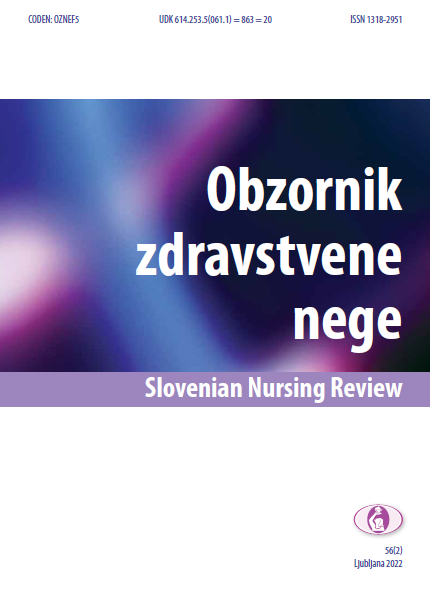Use of the Edinburgh postpartum depression scale for screening new fathers for postpartum depression
A pilot study
DOI:
https://doi.org/10.14528/snr.2022.56.2.3036Keywords:
childbirth, EPDS, postpartum mental health, men, menAbstract
Introduction: International research shows that approximately 10% of new fathers develop symptoms of postpartum depression in 4–6 months postnatal. The purpose of the research was to evaluate whether the adapted and translated version of Edinburgh Postpartum Depression Scale is reliable enough for screening postpartum depression of new fathers.
Methods: Quantitative study was conducted. Using the adapted Edinburgh Postnatal Depression Scale we interviewed fathers with 4–6 month old infants during the visit of a community health nurse. The sample included all suitable candidates in Ljubljana - Črnuče and Velenje community health centres between August and December 2019 (n = 80), sample realisation was 51 (63%). The Cronbach alpha coefficient was 0.931. The chi-square test was used for analysing data.
Results: Eight participants (15.7%) gathered score of 12 or more and were, therefore, at risk of developing postnatal depression. None of the respondents reported on having suicidal thoughts or intentions. The number of average achieved points was 6.76 (s = 3.99). The largest number of total points was 16 collected by one respondent (n = 1, 1.96%).
Discussion and conclusion: Despite the small sample, which prevents a generalization of study results, the findings of our pilot study conclude that the proportion of Slovenian new fathers at risk of developing postpartum depression is similar to those in foreign studies. The recommendation of the study is to pay more attention to the mental health of new fathers, especially in the first year postpartum, since their well-being may also affect other family members.
Downloads
Metrics
References
Asper, M. M., Carlberg, M., Hallen, N., Månsdotter, A., Carlberg, M., & Wells, M. B. (2018). Screening fathers for postpartum depression can be cost-effective: An example from Sweden. Journal of Affective Disorders, 241(1), 154–163. https://doi.org/10.1016/j.jad.2018.07.044 PMid:30121448
Bazemore, S. D., & Paulson, J. F. (2010). Prenatal and postpartum depression in fathers and its association with maternal depression: A meta-analysis. Journal of the American Medical Association, 303(19), 1961–1969. https://doi.org/10.1001/jama.2010.605 PMid:20483973
Bruno, A., Celebre, L., Mento, C., Rizzo, A., Silvestri, M. C., & De Stefano, R. (2020). When fathers begin to falter: A comprehensive review on paternal perinatal depression. International journal of Environmental Research and Public Health, 17(4), 1139–1157. https://doi.org/10.3390/ijerph17041139 PMid:32053929; PMCid:PMC7068539
Carlberg, M., Edhborg, M., & Lindberg, L. (2018). Paternal perinatal depression assessed by the Edinburgh Postnatal Depression Scale and the Gotland Male Depression Scale: Prevalence and possible risk factors. American Journal of Men's Health, 12(4), 720–729. https://doi.org/10.1177/1557988317749071 PMid:29350097; PMCid:PMC6131440
Dunford, E., & Granger, C. (2017). Maternal guilt and shame: Relationship to postnatal depression and attitudes towards helpseeking. Journal of Child & Family Studies, 26(6), 1692–1701. https://doi.org/10.1007/s10826-017-0690-z
Edmondson, O. J. H., Psychogiou, L., Vlachos, H., Netsi, E., & Ramchandani, P. G. (2010). Depression in fathers in the postnatal period: Assessment of the Edinburgh Postnatal Depression Scale as a screening measure. Journal of Affective Disorders, 125(1/3), 365–368.
https://dx.doi.org/10.1016%2Fj.jad.2010.01.069 PMid:20163873; PMCid:PMC2927780
Gawlik, S., Müller, M., Hoffmann, L., Dienes, A., Wallwiener, M., & Sohn, C. (2014). Prevalence of paternal perinatal depressiveness and its link to partnership satisfaction and birth concerns. Archives of Women's Mental Health, 17(1), 49–56. https://doi.org/10.1007/s00737-013-0377-4 PMid:24022743
Grey, P. B., Reece, J., Coore Desal, C., Dinnall-Johnson, T., Pellington, S., & Bateman, A. (2018). Patterns and predictors of depressive symptoms among Jamaican fathers of newborns. Social Psychiatry and Psychiatric Epidemiology, 53(10), 1063–1070. https://doi.org/10.1007/s00127-018-1566-2 PMid:30062481
Kamalifard, M., Hasanpoor, S., Kheiroddin, J. B., Panahi, S., & Payan, S. B. (2014). Relationship between fathers' depression and percieved social support and stress in postpartum period. Journal of Caring Sciences, 3(1), 57–66. https://doi.org/10.5681/jcs.2014.007.
Kiviruusu, O., Pietikäinen, J. T., Kylliäinen, A., Pölkki, P., Saarenpää-Heikkilä, O., & Marttunen, M. (2020). Trajectories of mothers' and fathers' depressive symptoms from pregnancy to 24 months postpartum. Journal of Affective Disorders, 260(1), 629–637. https://doi.org/10.1016/j.jad.2019.09.038 PMid:31542556
Koprivnik, P., & Plemenitaš, A. (2005). Pojavnost depresij v poporodnem obdobju v slovenskem vzorcu. Medicinski razgledi, 44(2), 139–45. Retrieved September 12, 2020 from https://medrazgl.si/pojavnost-depresij-v-poporodnemobdobju-v-slovenskem-vzorcu/
Newman, T. P., Hirst, J., & Darwin, Z. (2019). What enables or prevents women with depressive symptoms seeking help in the postnatal period. British Journal of Midwifery, 27(4), 219–227. https://doi.org/10.12968/bjom.2019.27.4.219
Matthey, S., Barnett, B., Kavanagh, D. J., & Howie, P. (2001). Validation of the Edinburgh Postnatal Depression Scale for men, and comparison of item endorsement with their partners. Journal of Affective Disorders, 64(2/3), 175–184. https://doi.org/10.1016/s0165-0327(00)00236-6.
Meltzer-Brody, S., & Stuebe, A. (2014). The long-term psychiatric and medical prognosis of perinatal mental illness. Best Practice & Research Clinical Ibstetrics & Gynaecology, 28(1), 49–60. https://doi.org/10.1016/j.bpobgyn.2013.08.009 PMid:24063973; PMCid:PMC3947371
Ramchandani, P. G., Psychogiou, L., Vlachos, H., Iles, J., Sethna, V., & Netsi, E. (2011). Paternal depression: An examination of its links with father, child and family functioning in the postnatal period. Depression and Anxiety, 28(1), 471–477. https://doi.org/10.1002/da.20814 PMid:21506206; PMCid:PMC3128925
Skočir, A. P. (2005). Glavne značilnosti poporodne depresije. Obzornik zdravstvene nege, 39(2), 119–129. Retrieved September 12, 2020 from https://obzornik.zbornica-zveza.si/index.php/ObzorZdravNeg/article/view/2542
Downloads
Published
How to Cite
Issue
Section
License
Copyright (c) 2022 Slovenian Nursing Review

This work is licensed under a Creative Commons Attribution 4.0 International License.
As the author undersigned hereby, I transfer, assign, or otherwise convey the following authorship rights as comprised in the Copyright and Related Rights Act (CRRA) to the Slovenian Nursing Review, Ob železnici 30A, 1000 Ljubljana: the right of reproduction - the exclusive right to fix the work in a material medium or in another copy directly or indirectly, temporarily or permanently, by any means and in any digital form, in whole or in part (CRRA, Article 23); the right of distribution (CRRA, Article 24); the right of making a work available and accessible through the internet (CRRA, Article 32a); the right of transformation, especially the exclusive right to translate a pre-existing work (CRRA, Article 33). The transfer of author rights applies to the article in its entirety, including pictorial and/or graphic works and possible supplements. The transfer of rights is exclusive and unlimited in duration or territory.
























